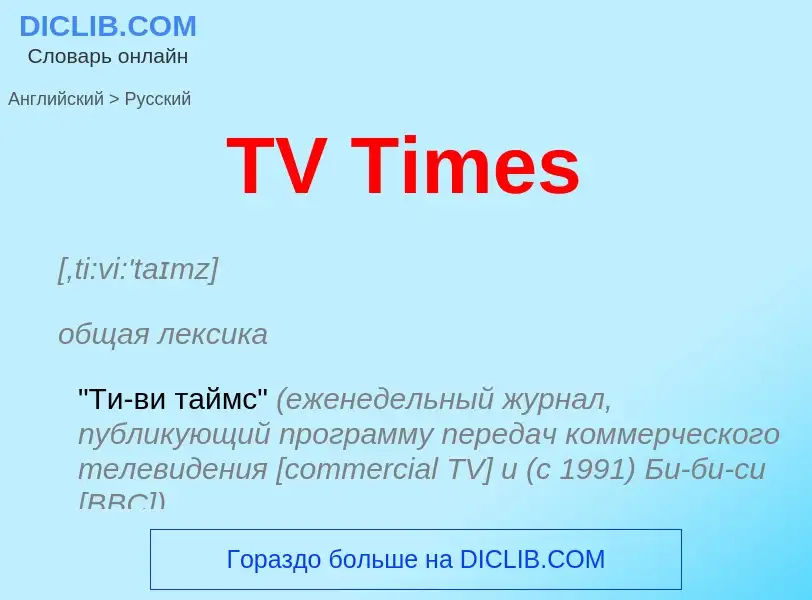Tradução e análise de palavras por inteligência artificial ChatGPT
Nesta página você pode obter uma análise detalhada de uma palavra ou frase, produzida usando a melhor tecnologia de inteligência artificial até o momento:
- como a palavra é usada
- frequência de uso
- é usado com mais frequência na fala oral ou escrita
- opções de tradução de palavras
- exemplos de uso (várias frases com tradução)
- etimologia
TV Times - tradução para Inglês
[,ti:vi:'taɪmz]
общая лексика
"Ти-ви таймс" (еженедельный журнал, публикующий программу передач коммерческого телевидения [commercial TV] и (с 1991) Би-би-си [BBC])
[,reɪdɪəu'taɪmz]
общая лексика
"Рейдио таймс" (еженедельный журнал Британской радиовещательной корпорации [British Broadcasting Corporation]; публикует программы теле- и радиопередач Би-би-си [BBC], а тж. телепередач Независимого телевидения [Independent Television]; тир. ок. 3 млн. экз.; издаётся в Лондоне. Основан в 1923)
[faɪ'nænʃtl,taɪmz]
общая лексика
"Файнэншл таймс" (ежедневная финансово-экономическая газета консервативного направления; влиятельный орган финансовых и деловых кругов; помимо коммерческой информации публикует тж. материалы по внутриполитическим и международным вопросам; печатается на розовой бумаге; тир. ок. 290 тыс. экз.; издаётся в Лондоне. Основана в 1888)
синоним
Definição
Wikipédia
TV Times is a British television listings magazine published by Future plc. It was originally published by Independent Television Publications, owned by the participating ITV companies. The magazine was acquired by IPC Media in 1989, which became Time Inc. UK in 2014.
Prior to 28 February 1991, it was the only source of seven-day listings for ITV and later, Channel 4 (includes S4C in Wales). The magazine was first published in 1955, but did not circulate nationally until 1968 as some (usually smaller) regional stations opted to produce their own listings publications. Until the market was deregulated, its nearest rival was Radio Times – owned then by the BBC and at the time the only source of weekly BBC television and radio schedules. However the two magazines were very different in character, and viewers wanting the full listings for the coming week were required to purchase both publications.
It also used the branding for several broadcast spin-offs on ITV, often include the Miss TV Times and The TV Times Awards during the 1970s and 1980s.


.png?width=200)

![BBC's coat of arms]] with the motto: "Nation shall speak peace unto nation" BBC's coat of arms]] with the motto: "Nation shall speak peace unto nation"](https://commons.wikimedia.org/wiki/Special:FilePath/Radio Times 1931 (masthead).jpg?width=200)


![market indices]], 2019 market indices]], 2019](https://commons.wikimedia.org/wiki/Special:FilePath/Indices Financial Times.jpg?width=200)
![Russian president [[Vladimir Putin]] being interviewed by [[Lionel Barber]] and Henry Foy of the ''Financial Times'' in 2019 Russian president [[Vladimir Putin]] being interviewed by [[Lionel Barber]] and Henry Foy of the ''Financial Times'' in 2019](https://commons.wikimedia.org/wiki/Special:FilePath/Vladimir Putin with The Financial Times (2019-06-27) 07.jpg?width=200)
